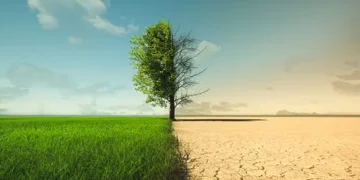The School of Social Policy & Practice (SP2) recently hosted a seminar titled “Climate Refugees: The Implications of our Changing Environment,” featuring insights from SP2 assistant professors R. Jisung Park and Alice Xu. Both professors approach the study of climate change from an interdisciplinary standpoint, integrating economics and political science into their research.
Dean Sally Bachman commenced the event, emphasizing SP2’s commitment to understanding the climate crisis as a critical social justice matter, addressed through education, research, and active community involvement.
During the event, moderated by Professor of Practice Ben Jealous, Park and Xu were invited to explicate their respective fields’ perspectives on the climate crisis. Park, an environmental economist, conveyed the importance of quantifying the human impacts of climate change to inform policy solutions that serve communities. Xu, from a political science background, highlighted the significant political challenges posed by climate change and the need for politically informed environmental insights.
Xu’s research has focused on the Global South, examining the tension between environmental and social policy issues, particularly the dynamics of poor populations forming informal settlements in urban parks and the subsequent risks of government eviction due to environmental justifications.
Park discussed the intersection of climate change and economic inequality, stressing the necessity to contextualize climate change impacts within broader economic trends. He also delineated climate risks into physical risks, like natural disasters, and transition risks associated with policy shifts to mitigate CO2 emissions, highlighting the potential socioeconomic disparities in bearing these costs.
The dialogue also touched on the concept of climate migration, with Xu noting the displacement of over 300 million people globally due to extreme weather affecting livelihoods, particularly in agriculture. She discussed the challenges faced by stateless refugees who cannot return to their homelands and their reliance on the empathy and solidarity of host countries.
Park added that climate-induced hardships might fuel an increase in climate refugees and contribute to a rise in authoritarianism and populism, reflecting on the human tendency to scapegoat outsiders during crises. He also pointed out that while some may migrate internationally, others might not have the resources and could be forced to undertake rural-urban migrations within their own countries.
The event concluded with a consideration of the various societal impacts of climate change, including the potential for heightened workplace risks due to extreme weather and the broader implications for global migration and policy-making.
Breaking supply chain news is just a click away at The Supply Chain Report. Enhance your knowledge of international trade at ADAMftd.com with free tools.
#ClimateRefugees #ClimateCrisis #SocialJustice #ClimateChangeResearch #InterdisciplinaryApproach #EnvironmentalEconomics #PoliticalScience #ClimateMigration #GlobalSouth #UrbanParks #EnvironmentalPolicy #ClimateInequality #ClimateDisplacement #RuralUrbanMigration #ExtremeWeather #SocioeconomicDisparities #SP2Seminar #SallyBachman #R JisungPark #AliceXu #BenJealous #SocialPolicyAndPractice #ClimateJustice #ClimatePolicy #MigrationAndPolicy #ClimateRefugeesDisplaced #EmpathyAndSolidarity #ClimateAction















